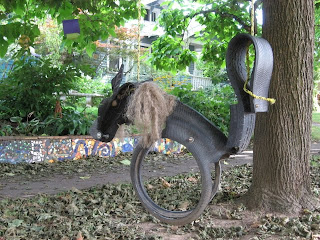




My dad is a lawyer. Among other things, he helps people decide what to do with their stuff when they die. As I learned, he also helps them decide what should be done with their bodies, should they reach a state where decisions about living or dying are necessary. I started thinking about this in the last few days – never before. I’ve never had anything of significance to give away, so writing a will hasn’t been of great concern, and I’ve always kind of hoped my body would just dematerialize after it was raided for useable organs. I embrace a little bit of chaos with regard to my dying, although I realize this is selfish. The main things I’ve considered have been of a more egotistical nature -- who would be sad, who would miss me, who would regret not having cast me as Reno Sweeney in “Anything Goes” in 1992, who would cry, who would want to read my journals. . . that sort of thing.
Visiting my 93 year-old grandparents in Seattle last weekend gave me pause for a couple of reasons -- it made me realize that while everyone around me is at work populating the planet with people who will care about them when they get old (ie, their children), there are still a few who don’t now and may never have anyone like that who offers the promise of being looked after in old age. Of course, one could argue that people who don’t get married and breed don’t usually live as long as those who do, so maybe these considerations will simply be irrelevant – wouldn’t that be nice! Honestly, I wouldn’t mind dying younger, less decrepit and less hideous-feeling than my familied brethren might. We never know for sure how things are going to work out. In case I do live to be old, I’ve made arrangements with my younger cousin and some of my former babysitting charges.
Another manifestation of my reflective state has been my re-reading of Hamlet, which I haven’t read since high school. A friend is fond of offering Shakespearean analyses of the dramas and conflicts I am wont to lay at her feet – she is a scholar, while I read the Spark Notes for various works of literature the way a passenger in a burning airplane would scan the emergency landing instructions. There is need. I need to know that someone has been grappling with the vagaries of human nature long before I have, that someone has learned something from it all, and exactly what that thing is. I had a love/nemesis in film school whose self-awareness unfortunately didn’t detract from his recklessness in matters of the heart, but who at least acknowledged that he was ‘playing Hamlet --’ referring to the old ‘no delay, no play’ aspect of the prince’s character. The duality of his hesitation and his impulsiveness made Hamlet a dynamic if vexing character – and of course the conflict created by this duality is part of what made the drama we know and love.
Shakespearean drama aside, Portland is a shockingly pleasant place. Even though I grew up here and visit a couple times a year, I always find myself surprised by how friendly everyone is, how easy it is to get around and get things done, how often I find myself using the word ‘nice’ to describe people I meet and places I visit. What other North American city has a chain called ‘Clogs n’ More?’ That kind of says it all. Its ease leaves me feeling a little on edge – waiting for someone to make a biting sarcastic remark or to be assaulted by some deafening noise, demand or movement. No such assault is forthcoming – just mellow people with beards, great coffee, vintage Mercedes running on vegetable oil, and the progressive politics of a large liberal arts college campus.
This leads me back to Hamlet and the subject of will. When things come too easily, is there a danger in not knowing how to want? What motivates a character who doesn’t acknowledge or hasn’t grappled with his/her own desires? How does truth, when uncovered, necessitate change? To add to his complexity, Hamlet was a man who feigned insanity in order to leave those around him confused about his motives. If I didn’t know otherwise, I would assume he had been trained in the evasion techniques of U.S. Military operatives.
I went to a poetry reading/musical performance last night in the Wieden and Kennedy building, where my friend Willy played a few songs between recitations from The Burnside Reader, a long hallowed poetry anthology. We concluded that poetry is a tough medium, and we chased the event with a large fully-comped meal at Nel Centro, where my friend Lee is the pastry chef. I remembered how good it is to be in the restaurant business and the three of us had a meaty panel discussion on the death (and perhaps imminent rebirth?) of the music industry. Although its ease has been somewhat of a detracting factor for me for fear I would be lulled into sleepiness, Lee and Willy are fine examples of productive people who live in Puddletown and open restaurants, put out records and publish novels. . . along with quilting, raising horses and other cool Oregon stuff.
Perhaps after all, it’s too early to draw conclusions about what motivates people in their decisions – either in life or in death.




I guess you'll have to come back to NY to see Jude Law as Hamlet on Broadway.
ReplyDelete